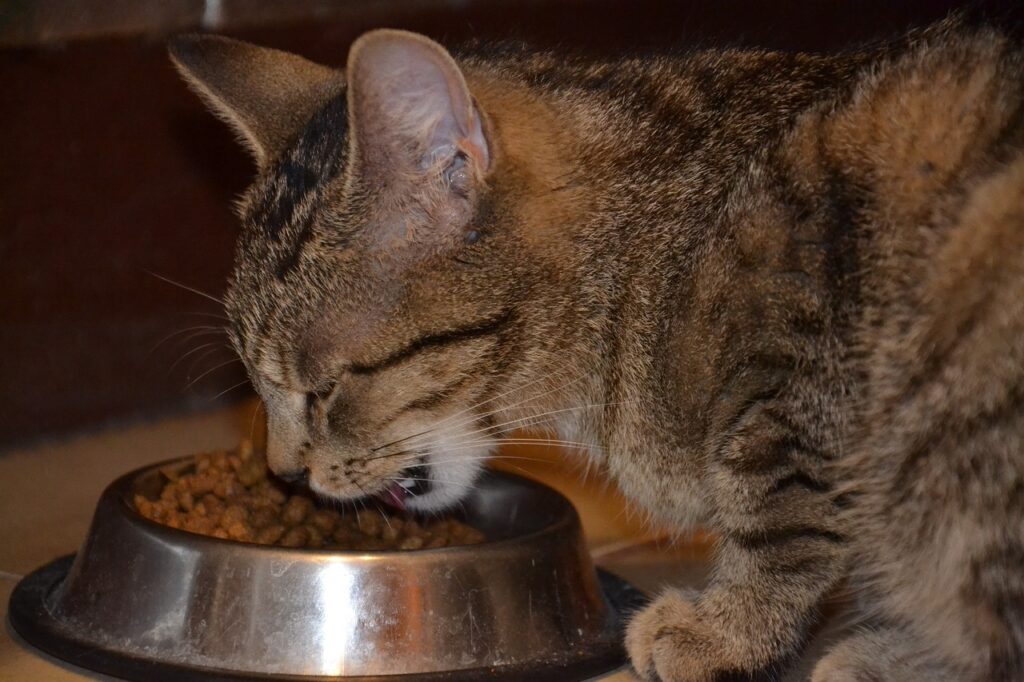Cats have a well-known reputation for being selective when it comes to their food preferences. Therefore, if you ever find yourself in a situation where you unexpectedly run out of cat food and are unsure about what to do, we understand your dilemma. You’re not alone in contemplating whether it’s acceptable to temporarily feed your cat dog food until you can restock.
Perhaps you’ve even caught your beloved feline sneaking a taste from the dog’s bowl, which leads you to question the safety of feeding dog food to your cat. Although it’s uncommon for cats to show interest in dog food, if they happen to develop a liking for it, you may wonder if it poses any risks.
Rest assured, we’ve got all the information you need regarding cats consuming dog food. Continue reading to discover the essentials of cats and dog food compatibility.
Is it Safe for Cats to Eat Dog Food?
Giving your cat dog food in small amounts is generally considered safe. However, it’s crucial to recognize that dogs and cats are distinct species with significantly different nutritional requirements. While feeding your cat dog food temporarily may not cause immediate problems, prolonged consumption can lead to complications and health issues.
Over time, cats fed with dog food as a long-term substitute may encounter various health concerns. It’s important to prioritize your cat’s well-being and provide them with a balanced and appropriate diet specifically formulated for feline nutrition.
Difference Between Cat Food and Dog Food
First and foremost, it’s essential to acknowledge that cat food and dog food differ significantly in their nutritional composition. One notable distinction is the higher protein content in cat food. Cats are obligate carnivores, meaning they rely on meat-based proteins and animal fats for optimal nutrition. In contrast, dogs are omnivores and can thrive on a diet that includes both meat and some vegetable content.
Moreover, cats and dogs have distinct taste preferences. While dogs often enjoy cat food due to its high protein content, cats rarely show interest in dog food because it simply doesn’t appeal to their taste buds. Felines possess a different taste system, and their food is specifically formulated to cater to their unique preferences.
For instance, cats lack the ability to taste sweetness, unlike dogs. Research suggests that cats exhibit indifference towards sweet carbohydrates and sweeteners due to changes in their sweet receptor gene. This could explain their selective eating habits, as they rely on other taste receptors.
Cats require specific ingredients in their diet that are not typically found in dog food. For instance, cats cannot produce taurine (an essential amino acid for digestion, vision, and heart health) on their own, unlike dogs. Additionally, cats require arachidonic acid, a fatty acid that dogs can synthesize internally. Insufficient arachidonic acid in a cat’s diet can lead to liver and kidney problems, impaired blood clotting, and increased skin issues.
Vitamin A is another vital dietary element that cats need. Although dog food may contain some vitamin A, it is often insufficient for a cat’s requirements.
The carbohydrate needs of dogs and cats also differ significantly. Cats require fewer carbohydrates in their diet, and an excess of carbs can contribute to weight gain and other problems, including diabetes. Dogs, on the other hand, typically require a higher carbohydrate intake, often derived from plant sources that cats do not typically consume.
Summary
Due to the distinct nutritional requirements of dogs and cats, giving your cat an occasional taste of dog food is unlikely to cause harm. However, relying solely on dog food as a long-term diet for your cat will not meet their specific nutritional needs and can lead to health problems.
In situations where you have no other option and must feed your cat dog food, it should be generally safe. However, it’s important to closely monitor your cat for any potential allergic reactions or sensitivities that may arise.
If your cat is indulging in snacks from the dog’s bowl, there’s no immediate cause for concern. Nevertheless, it’s advisable to discourage this behavior since dog food often contains higher levels of carbohydrates than cats require. The drawback is that excessive carbohydrates in a cat’s diet can contribute to weight gain and increase the risk of conditions such as diabetes.

